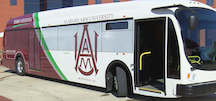Here is this week’s news of grants or gifts to historically Black colleges and universities or for programs of particular interest to African Americans in higher education.
 Historically Black Alabama A&M University received $8.1 million in grant funding from the U.S. Department of Transportation for upgrades, expansion of facilities for its transit systems, as well as other clean energy projects. The grant will fund a 60 percent increase in the campus electric bus fleet, new vehicle charging stations, and an increase in the footprint of the university’s solar farm.
Historically Black Alabama A&M University received $8.1 million in grant funding from the U.S. Department of Transportation for upgrades, expansion of facilities for its transit systems, as well as other clean energy projects. The grant will fund a 60 percent increase in the campus electric bus fleet, new vehicle charging stations, and an increase in the footprint of the university’s solar farm.
The University of Central Florida received a five-year, $1.85 million grant from the National Institutes of Health’s National Institute of Aging. The grant will fund the university’s Investigators from Novices, a Transdisciplinary Research Education Program to Increase Diversity (INTREPID) program. The goal of the program is to increase the number of underrepresented and disadvantaged undergraduate students in STEM disciplines who advance into graduate research programs focused on health disparities in aging.
Tuskegee University, the historically Black educational institution in Alabama received $250,000 worth of lighting and equipment from local businesses through a campaign by Division 12 Consulting, a minority-owned contract furnishings company based in Montgomery, Alabama. The electrical and LED lighting, lighting parts, electrical ballasts, and bulbs will be used on campus to enhance the student experience and increase safety.
The Small Farm Outreach Program, a part of Virginia Cooperative Extension administered by the College of Agriculture at historically Black Virginia State University, is the recipient of nearly $4 million in grants and sub-awards to help battle food insecurity by bridging the gap between urban farmers and the U.S. Department of Agriculture’s Farm Service Agency. The university will develop a National Urban Agricultural Program that will help urban growers develop the necessary knowledge and skills to access and use federal programs, tools and services successfully. The university will also participate in a pilot project with Cornell University in New York to develop a model program that will establish evidence-based best practices that empower all states to establish their own regional or local urban farmer programs.

